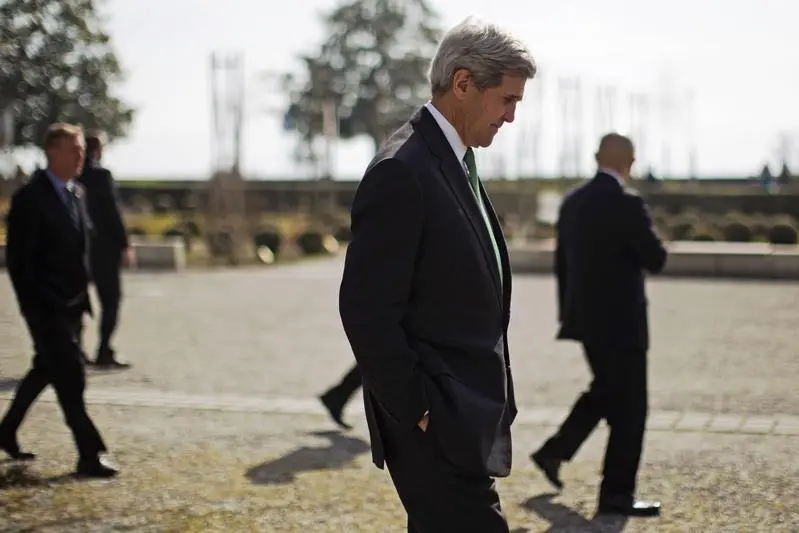PHOTO
By Louis Charbonneau, John Irish and Arshad Mohammed
VIENNA, June 29 (Reuters) - The United States on Monday rejected criticism that world powers negotiating a nuclear agreement with Iran have been making too many compromises, saying it hoped to get a good deal but was not certain that was achievable.
A senior U.S. official, speaking on condition of anonymity, said Vienna talks would continue past Tuesday's deadline for a comprehensive agreement intended to open the door to ending sanctions in exchange for limits on Iran's most sensitive nuclear activities for at least a decade.
The West suspects Iran may be secretly developing technology that would allow it to build nuclear weapons, but Tehran says its programme is for peaceful purposes only.
The U.S. official was asked to respond to public criticism of the U.S. delegation in the talks and suggestions that the administration of President Barack Obama had been making too many concessions out of desperation to do a deal.
"We still do not know yet whether we will be able to get there," he said. "We want to, we hope to, but we do not know."
Israeli Prime Minister Benjamin Netanyahu on Sunday accused the United States, Britain, France, Germany, Russia and China of retreating from tough positions in the talks.
"We see before our very eyes a stark retreat from the red lines that the world powers set themselves only recently, and publicly," he said. "There is no reason to hasten into signing this bad deal, which is getting worse by the day."
The U.S. official said the United States would not have spent endless time on negotiations just to give in at the end.
"It's really absurd," the official said.
"If we were going to cave, I could be home already and I would be a really happy person ... we would have done that a long time ago," the official said. "Why would we be spending the hours doing this in the way we are if, you know, we were just (going to say to Iran) 'well whatever you want, you got'."
Washington was holding fast to a set of parameters agreed on April 2 in Lausanne, Switzerland and expected Iran to do the same, the official said.
Other Western officials, including Britain's Foreign Secretary Philip Hammond, have suggested Iran is backtracking on commitments that it had made in Lausanne.
The U.S. official stressed the interim deal was the foundation for any final agreement.
"We do see a path forward to get a comprehensive agreement that meets our bottom lines and this path forward has to be based on the Lausanne parameters - period," said the official, turning to an interpreter and asking him to repeat it in Farsi.
MONITORS' ACCESS
The main differences are on the pace and timing of sanctions relief for Iran and on the nature of monitoring mechanisms to ensure Tehran does not cheat on any agreement. One of the biggest sticking points is Western demands that U.N. inspectors have access to Iranian military sites and nuclear scientists.
The official said that the six powers had come up with a system to ensure that the International Atomic Energy Agency (IAEA) would have the necessary access, though there was no suggestion the Iranians had agreed to that system.
Iranian Foreign Minister Mohammad Javad Zarif, who flew back to Tehran on Sunday for consultations with the leadership, was due to return to Vienna on Tuesday morning, a senior Iranian official told Reuters. Among the issues he was expected to discuss was monitoring and verification and IAEA access.
"Iran's nuclear chief (Ali Akbar) Salehi will join the talks in Vienna soon," the official said, referring to the influential head of Iran's Atomic Energy Organisation. "The talks are intensive and ... will possibly run into July. But just a few days."
Iran's Supreme Leader Ayatollah Ali Khamenei has echoed other hardline Iranian officials and ruled out international access to Iranian military sites.
U.S. and European negotiators also want to ensure there is a mechanism for restoring sanctions if Tehran fails to meet its commitments under any future accord.
In New York, French Foreign Minister Laurent Fabius said the talks had made "some progress, but still it is not the end of the process."
(Additional reporting by Parisa Hafezi and John Irish; Editing by Ralph Boulton) ((arshad.mohammed@thomsonreuters.com; +1 202 898 8300; Reuters Messaging: arshad.mohammed.thomsonreuters.com@reuters.net))





















